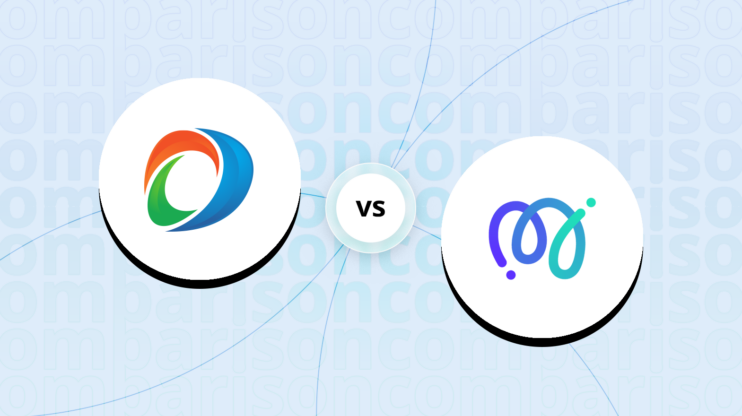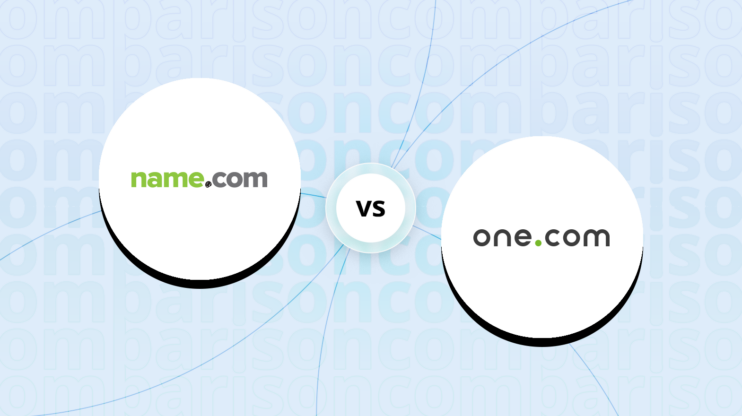Liquid Web vs Web Hosting Hub: Final verdict
Looking over Liquid Web vs. Web Hosting Hub, Liquid Web edges out with its superior performance features and advanced technical support.
-
Liquid Web (Overall grade: 8.7)
is notable for its comprehensive hosting solutions designed for high-availability needs. It excels in providing advanced features such as SSD and NVMe storage, AMD EPYC processors, and a 10 Gbps network speed. Liquid Web’s high-performance environment includes automatic image compression, object caching, and integration with Cloudflare CDN, making it particularly suitable for high-traffic and multimedia websites. Their SLA promises 100% network and power uptime, backed by proactive monitoring and quick hardware issue resolution through Sonar™. Despite the higher costs associated with their premium features and services, Liquid Web’s offerings like managed file replication, dedicated and VPS hosting, and robust day-to-day management and support make it a reliable choice for businesses requiring strict compliance and top-tier performance.
Web Hosting Hub (Overall grade: 7.5)
delivers accessible and cost-effective hosting solutions, making it a good choice for beginners and smaller businesses. Its plans include free SSDs, SSL certificates, unlimited bandwidth, and a user-friendly website builder, BoldGrid, which simplifies building and managing websites. The provider offers 24/7 U.S.-based customer support and a 90-day money-back guarantee, ensuring users have ample security and assistance. The scalability options, such as the Spark, Nitro, and Dynamo plans, cater to different performance needs without stretching budgets, although they lack dedicated server and advanced scaling options. However, Web Hosting Hub’s lower hardware specifications and fewer performance optimization tools limit its capability for more demanding or complex hosting needs compared to Liquid Web.
 Overall grade:8.7 |
 Overall grade:7.5 |
|
|---|---|---|
| Uptime and Availability | 9.4 | 9.2 |
| Hosting Performance | 8.5 | 5.0 |
| Hosting Security | 9.0 | 8.0 |
| Price | 8.4 | 7.6 |
| Hosting Features | 7.9 | 6.9 |
| Ease Of Setup | 9.3 | 8.8 |
| User Management | 7.8 | 7.1 |
| Customer Support | 9.6 | 7.8 |
| User feedback | 4.3/5 | 4.5/5 |
Hosting types offered
Both platforms provide a variety of hosting types, each designed to meet the different needs of users.
 |
 |
|
|---|---|---|
| Shared hosting | ||
| Cloud hosting | ||
| WordPress hosting | ||
| Ecommerce hosting | ||
| VPS hosting | ||
| Dedicated hosting |
Although both offer a variety of hosting plans tailored to different needs, in certain cases, one platform may prove to be more suitable.
Detailed comparison
Uptime and availability
Evaluates the average uptime statistics, uptime guarantee and overall availability of the hosting
provider
Score Components:
- Uptime percentage (30%): evaluates the uptime statistics in given period of time
- Uptime guarantee (20%): Assesses if the platform offers an uptime guarantee and
whether the actual uptime matches the promised guarantee. - General performance (25%): Evaluates how fast is the average response time and overall
it’s stability. - Responsiveness (10%): Adaptability to different devices and screen sizes.
- Availability (25%): Reflects the total downtime and number of outages.
 9.4
9.4
 9.2
9.2
🏆 Winner Liquid Web: Liquid Web offers unmatched uptime and availability for mission-critical hosting needs.

Liquid Web stands out with its 100% network and power uptime SLAs and is designed for high availability. The multi-server environments, along with managed file replication options, ensure continuous service. Their proactive monitoring via Sonar™ and a 30-minute hardware SLA guarantee quick issue resolution, creating a highly reliable hosting environment. The initial response times of less than a minute for phone and chat support also contribute to customer satisfaction.

Web Hosting Hub is a strong contender with great speed and uptime, backed by competitive pricing. Their plans include free SSDs, SSLs, and unlimited bandwidth, enhancing site performance and availability. The Spark, Nitro, and Dynamo plans offer scalable performance options, from standard to 4X, accommodating varied business needs. Additionally, their 24/7 support and 90-day money-back guarantee provide added security.
Which one has better hosting performance?
Score Components:
- Hosting speed (30%): This includes SSD quality, Load times, PageSpeed score ranges,
additional information on website speed, built-in plugins for performance enhancement, available caching
methods, and CPU/RAM options - CDN (20%): Considers whether CDN is available or not, whether it’s free or paid, and
the quality of the CDN service - Available data centers (30%): Evaluates the number of data centers and their locations
globally. - Scalibility (20%): Looks at whether elastic scaling is available, the process required
to scale (manual upgrade vs. automatic scaling), the presence of dedicated servers, and the costs
associated with scaling.
 8.5
8.5
 5.0
5.0
🏆 Winner
Liquid Web: Offers advanced hosting features and exceptional support.
When comparing Liquid Web and Web Hosting Hub, Liquid Web stands out with superior performance features. Liquid Web offers high-speed hosting with SSD and NVMe storage, AMD EPYC processors, and 10 Gbps network speeds. It includes free CDN integration, efficient caching methods, and multiple global data centers. In contrast, Web Hosting Hub provides SSD hosting across its plans but with limited data center options and lacks advanced caching features.
Website Speed
Liquid Web enhances website speed with integrated features like VMware private cloud, automatic image compression, object caching, and Cloudflare CDN. These optimizations, along with their high-tech server hardware, ensure that websites have minimal load times and smooth performance. Web Hosting Hub offers good speed but is restricted by lower hardware specs and fewer performance-enhancing tools compared to Liquid Web.
Scalability
Liquid Web offers easy scalability options including VPS, dedicated servers, and cloud solutions. With options for automatic scaling in managed WordPress and WooCommerce hosting, businesses can grow without worrying about capacity. It also offers custom solutions for highly specific needs. Scaling costs can vary, but are typically premium due to the advanced services. Web Hosting Hub provides upgrade paths between plans but lacks dedicated servers and does not support automatic scaling.
Which one has better security features?
and regulatory requirements
Score Components:
- Technical security measures (40%): This includes encryption, firewalls, DDoS
protection, secure configurations, server monitoring, access control and availability of security addons
(e.g Sitelock security). - Operational security measures (30%): Encompasses data privacy, backups and data
redundancy. - Compliance and certifications (20%): Adherence to legal and regulatory requirements
(e.g., GDPR, HIPAA) and possession of certifications (e.g., ISO 27001, SOC 2). - Business and reliability (10%): Factors in the provider’s reputation, uptime
guarantees, and customer support.
 9.0
9.0
 8.0
8.0
🏆 Winner
Liquid Web: Offers robust security features and compliance solutions suitable for handling sensitive customer data.
Both Liquid Web and Web Hosting Hub have notable differences in their approaches to technical and operational
security, as well as in their compliance with regulations.
Technical security measures:
Liquid Web provides a comprehensive suite of technical security measures, including SSL certificates to secure websites and DDoS attack protection to defend against sudden malicious traffic. Conversely, Web Hosting Hub offers free SSL certificates and various encryption methods such as suPHP and GnuPG. While Liquid Web supports multiple PHP versions, Web Hosting Hub is limited to PHP 7. Liquid Web also features a web application firewall, which Web Hosting Hub does not specify.
Operational security measures:
Liquid Web’s operational security includes 24/7 on-site support, firewalls, VPNs, and an extensive intrusion detection system. Physical security measures are also robust, featuring manned facilities, CCTV cameras, and advanced fire prevention systems. Web Hosting Hub offers similar round-the-clock support but emphasizes data privacy without detailing physical security measures. Liquid Web also provides data encryption at-rest and server hardening, which Web Hosting Hub doesn’t specify in detail.
Compliance and certifications:
Liquid Web complies with PCI, GDPR, and HIPAA guidelines, offering solutions like managed services and data protection addendums. They also have certifications such as SSAE-22 and HITECH for HIPAA compliance. Web Hosting Hub focuses on data security but does not explicitly mention GDPR or PCI compliance, lacking the detailed compliance offerings and certifications that Liquid Web provides.
 |
 |
|
|---|---|---|
SSL certificate |
Yes |
Free SSL |
Additional security features |
Firewalls, DDoS Protection, Intrusion Detection System, Data Encryption at-rest |
Firewall Protection, suPHP Encryption, GnuPG Encryption |
PHP versions |
Multiple |
PHP 7 |
GDPR compliance |
Yes |
Not specified |
HIPAA compliance |
Yes |
Not specified |
PCI compliance |
Yes |
Not specified |
Hosting features
Score Components:
- Domains (20%): Assesses the availability of a free domain, domain purchase options, and
pricing - Email (15%): Considers if the provider offers full email hosting, or is reselling
third-party service, and if the email is only transactional or not - Website builder (15%): Checks if website builder is available, and it’s user
friendliness and overall the level of customization allowed. - Staging environment (20%): Determines if a staging environment is available, allowing
for testing changes before going live. - FTP & SFTP accounts (10%): Evaluates if and how easily users can access FTP and
SFTP accounts - Git and SSH access (20%): Assess whether Git is integrated into the hosting service and
if SSH access is provided
 7.9
7.9
 6.9
6.9
🏆 Winner
Liquid Web: Superior managed hosting solutions for complex and high-availability environments.
Liquid Web and Web Hosting Hub cater to different user needs, offering unique features suited to various levels of complexity and expertise. Liquid Web focuses on providing high-end, fully managed hosting solutions, making it ideal for users who need proactive management, compliance with strict standards like HIPAA or PCI, and a robust support infrastructure. The hosting environment is geared towards complex setups with options such as VMware Private Cloud, managed VPS, and dedicated WordPress and WooCommerce hosting, ensuring high performance and security. While not explicitly mentioned, FTP/SFTP access is typically supported alongside SSH, aligning with their service levels. Liquid Web doesn’t offer a website builder, which might be a drawback for beginners looking for an all-in-one solution.
On the other hand, Web Hosting Hub is more beginner-friendly, offering a free domain registration and a free website builder, BoldGrid. This drag-and-drop interface simplifies the website creation process, attracting users looking to establish a quick online presence without deep technical knowledge. Web Hosting Hub focuses on performance and affordability, providing options like free SSDs and SSL certificates, unlimited email accounts, and easy installation of applications via Softaculous. SSH access is available across all plans, though FTP/SFTP isn’t explicitly mentioned, it is likely included due to cPanel availability. The pricing model, especially with discounts on plans, and a 90-day money-back guarantee makes it an attractive option for users with smaller projects or those just starting.
 |
 |
|
|---|---|---|
Free domain |
No |
Yes |
Free SSL |
Yes |
Yes |
Email hosting |
Yes |
Yes |
Website builder |
No |
Yes |
Staging environment |
Yes |
No |
FTP & SFTP account |
Yes |
Yes |
Git and SSH access |
Yes |
Yes |
Free backup |
Daily backups |
$1/month |
Money back guarantee |
No |
Yes, 90 days |
a location.
As a result in rare cases the features mentioned here can differ from the ones you see on their websites.
Both providers support a range of users from beginners to experts with user-friendly website builders and WordPress staging areas. However, in terms of developer tools, both Liquid Web and Web Hosting Hub offer robust options including SSH access, support for multiple programming languages, and Git for version control, thus appealing to developers looking for advanced capabilities.
Email services:
Liquid Web offers email hosting with various plans, including unlimited email for their WordPress hosting, ensuring businesses can manage their communications effectively. However, they do not mention dedicated transactional email capabilities or third-party email services. Web Hosting Hub goes a step further by offering secure POP3/IMAP email, spam protection, and email forwarding. They also support email configuration on multiple devices and offer unlimited email accounts across all plans, making it a solid choice for both individual users and businesses planning to run email campaigns.
Price
Score Components:
- Plan value (40%): What each pricing tier offers.
- Transparency and clarity (30%): Clearness of pricing structures.
- Flexibility of plans (20%): Range of options to suit different budgets.
- Hidden costs (10%): Additional expenses not included in the plan.
 8.4
8.4
 7.6
7.6
🏆 Winner Liquid Web: Liquid Web scores slightly higher overall, mainly due to the robust features included in their plans and the transparency of what’s included.
Evaluating the pricing of plans among various hosting providers can be complex due to their differing pricing and renewal strategies. Additionally, certain plans require annual commitments, which adds to the difficulty of making comparisons. The prices listed are based on monthly commitments; plans requiring annual commitments are indicated. Additionally, although some providers offer identical plans for WordPress and shared hosting, we have created separate tables for each to enhance clarity.
Liquid Web and Web Hosting Hub offer varied pricing plans with distinct benefits. Liquid Web provides specialized plans such as Managed WooCommerce and WordPress hosting, with monthly prices ranging from $21 to over $1095, featuring detailed performance elements like PHP workers and autoscaled workers per site. Web Hosting Hub offers simpler shared hosting plans like Spark and Nitro, with lower monthly prices ($5.99 to $9.99), focusing on unlimited storage and bandwidth, free domains, and comprehensive support. Liquid Web also has high-tier options like managed VPS, dedicated servers, and enterprise solutions, which are more geared toward complex and large-scale needs.

|

|
|---|---|
|
Spark$21:
Up to 1 site, 15GB Storage, 2TB Bandwidth, 24/7/365 support, PHP workers, SSD Value for price:8.5
|
Spark Plan$11.99:
2 websites, unlimited storage, unlimited bandwidth, 24/7/365 support, free domain, SSL, SSD Value for price:8.0
|
|
Spark+$43:
Up to 3 sites, 25GB Storage, 2.5TB Bandwidth, 24/7/365 support, PHP workers, SSD Value for price:8.4
|
Nitro Plan$15.49:
Unlimited websites, unlimited storage, unlimited bandwidth, 24/7/365 support, free domain, SSL, SSD Value for price:8.2
|
|
Maker$47.85 for 3 months, then $87:
Up to 5 sites, 40GB Storage, 3TB Bandwidth, 24/7/365 support, PHP workers, SSD Value for price:8.1
|
Dynamo Plan$20.49:
Unlimited websites, unlimited storage, unlimited bandwidth, 24/7/365 support, free domain, SSL, SSD Value for price:8.3
|

|

|
|---|---|
|
N/A
Value for price:N/A
|
Spark Plan$11.99:
2 websites, unlimited storage, unlimited bandwidth, 24/7/365 support, free domain, SSL, SSD Value for price:8.0
|
|
|
Nitro Plan$15.49:
Unlimited websites, unlimited storage, unlimited bandwidth, 24/7/365 support, free domain, SSL, SSD Value for price:8.2
|
|
|
Dynamo Plan$20.49:
Unlimited websites, unlimited storage, unlimited bandwidth, 24/7/365 support, free domain, SSL, SSD Value for price:8.3
|

|

|
|---|---|
|
Essential$20:
2 vCPU, 2 GB RAM, 40 GB SSD Storage, 10 TB Bandwidth, 24/7/365 support Value for price:8.8
|
N/A
Value for price:N/A
|
|
Advanced$30:
4 vCPU, 4 GB RAM, 100 GB SSD Storage, 10 TB Bandwidth, 24/7/365 support Value for price:8.7
|
|
|
Professional$40:
8 vCPU, 8 GB RAM, 150 GB SSD Storage, 10 TB Bandwidth, 24/7/365 support Value for price:8.6
|
|
|
Elite$50:
12 vCPU, 12 GB RAM, 200 GB SSD Storage, 10 TB Bandwidth, 24/7/365 support Value for price:8.5
|
|
|
Intel Xeon E-2356G$159:
16 GB RAM, 480 GB SSD RAID-1, 10 TB Bandwidth, 24/7/365 support Value for price:8.5
|
|
|
Intel Xeon E-2356G$199:
32 GB RAM, 960 GB SSD RAID-1, 10 TB Bandwidth, 24/7/365 support Value for price:8.4
|
|
|
Intel Xeon E-2356G$249:
64 GB RAM, 1.92 TB SSD RAID-1, 10 TB Bandwidth, 24/7/365 support Value for price:8.3
|
|
Enterprise plans
Liquid Web provides superior enterprise hosting solutions with comprehensive features like managed security, high availability web servers, dedicated VPS, and load balancing, making it suitable for large businesses and complex applications. Web Hosting Hub, while offering robust support and various features in their shared plans, lacks the specialized enterprise-level solutions found with Liquid Web’s offerings. Liquid Web is the preferable choice for enterprises seeking extensive, high-performance hosting capabilities.
Liquid Web vs Web Hosting Hub: Ease of setup
platform.
Score Components:
- Site migration (25%): Assesses whether the provider offers tools for site migration,
either automated or manual, and whether these services are free or require a fee. - Admin panel usability (35%): Evaluates the type of admin panel provided, such as the
standard cPanel or a custom solution, focusing on its accessibility and user-friendliness for both
technical and non-technical users. - Setup features (20%): Examines the availability and ease of use of various setup
features, including FTP accounts, file managers, email account setup, PHPMyAdmin, and easy CDN
configuration. - Help center quality (20%): Measures the quality and accessibility of the provider’s
help center resources, including articles and tutorials.
 9.3
9.3
 8.8
8.8
🏆 Winner Liquid Web: Delivers an intuitive setup with extensive managed services and proactive support features.
Liquid Web provides a variety of control panels, including InterWorx, Plesk, and WHM/cPanel, which are all standard and widely recognized for their user-friendliness. These admin panels come with intuitive interfaces that make server and website management accessible to both technical and non-technical users. Their Managed WordPress Hosting simplifies website maintenance through automated updates and proactive monitoring. On the other hand, Web Hosting Hub employs Softaculous for one-click installations of over 400 applications and includes BoldGrid, a drag-and-drop builder with its plans. Despite these user-friendly offerings, the panels provided by Web Hosting Hub may offer less depth compared to Liquid Web’s more advanced solutions.
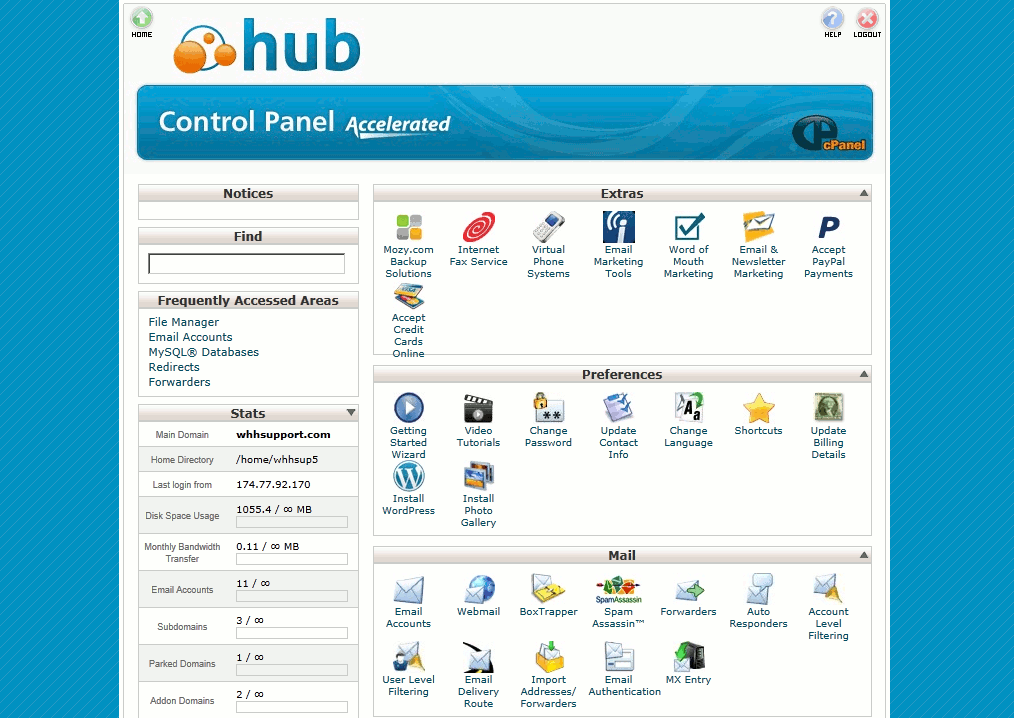
Liquid Web on the other hand, offers a dual interface that combines a custom dashboard with full cPanel access, catering to both beginners and technically advanced users. The platform includes a comprehensive help center filled with a wide variety of guides and tutorials, aimed at assisting users in managing and optimizing their websites effectively.
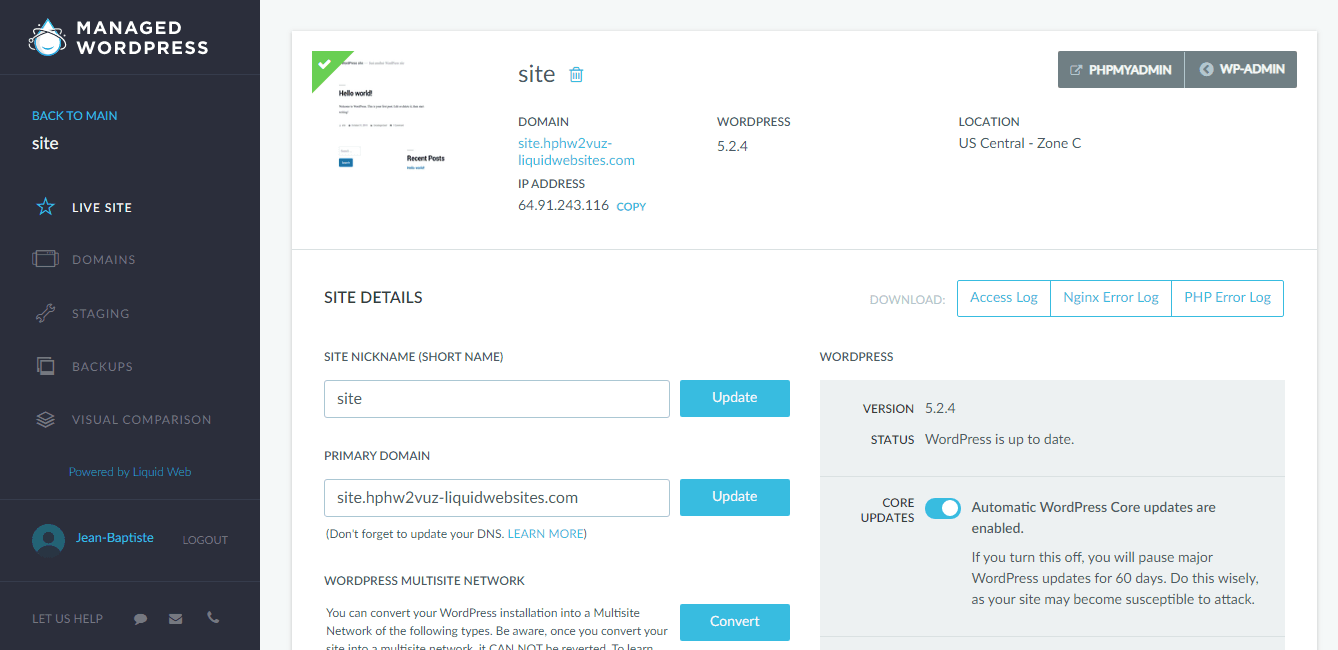
Both Liquid Web and Web Hosting Hub offer migration services for websites, but their approaches and costs differ. Liquid Web provides complimentary migrations for new server orders, covering most hosting control panels like InterWorx, Plesk, and cPanel, which alleviates the hassle and potential costs of migration. Web Hosting Hub also offers free website transfers but requires manual intervention. While Liquid Web’s managed services may be more advantageous for seamless and professional migrations, Web Hosting Hub’s services are satisfactory for users seeking a cost-effective solution.
Liquid Web’s knowledge base is extensive, packed with articles, tutorials, and step-by-step guides on various topics, ensuring users can easily find solutions to common issues. Additionally, their 24/7/365 human support promises rapid response times for any inquiries. Web Hosting Hub’s help center also provides a comprehensive knowledge base, learning resources, and community Q&A, complete with tutorials on a wide range of topics. However, Liquid Web’s proactive monitoring and additional support services give it an edge in helping users efficiently manage and resolve issues.
User management
accessibility.
Score Components:
- Role customization (40%): Flexibility in creating and defining user roles and
permissions. - Ease of management (30%): User interface and tools for managing users.
- Access control (20%): Effectiveness of access control measures for different user
levels. - Scalability (10%): Ability to manage a growing number of users efficiently.
 7.8
7.8
 7.1
7.1
🏆 Winner Liquid Web: Liquid Web offers a more comprehensive suite of user management features through Plesk.
Liquid Web and Web Hosting Hub both offer robust user management capabilities, but they differ significantly in their approach and flexibility. Liquid Web via Plesk provides granular control over user roles and permissions, allowing the creation, editing, and assignment of specific roles like Administrator, Webmaster, Application User, and Accountant. These roles come with preset permissions, and users can also create custom roles tailored to specific needs. Web Hosting Hub, on the other hand, offers essential user management features through cPanel but lacks detailed role customization options. Web Hosting Hub focuses more on managing email, FTP accounts, and security settings but does not provide the extensive role-based user management that Liquid Web does.
Both Liquid Web and Web Hosting Hub provide user-friendly interfaces for managing users, though they utilize different tools. Liquid Web uses the Plesk control panel, which features a clear and intuitive layout for accessing and managing user accounts. The Plesk interface allows users to quickly create new accounts, assign roles, and set permissions. Web Hosting Hub uses the widely recognized cPanel interface, which offers straightforward options for managing email accounts, FTP access, and security settings. While cPanel is highly functional and easy to navigate, it does not match the detailed user role management offered by Plesk.
When it comes to access control and managing a growing number of users, Liquid Web demonstrates higher efficiency and effectiveness. The ability to create additional administrator accounts, define custom user roles, and set detailed permissions ensures that organizations can manage access securely and efficiently. Web Hosting Hub does offer effective security measures such as password-protected directories and IP blocking, but its capabilities are more geared toward general site security rather than detailed user access management. Liquid Web’s Plesk panel is better suited for organizations with complex user management needs, whereas Web Hosting Hub’s offerings are more basic and sufficient for simpler environments.
Liquid Web user roles table:
| Role | Description | Access highlights |
|---|---|---|
| Administrator | Full access to Plesk control panel and server management | Can perform all actions including creating new users and managing the entire server. |
| Webmaster | Manages most aspects of subscriptions | Can create new sites and configure DNS, mail, and FTP but cannot create new users or manage roles. |
| Application User | Limited access | Restricted to specific applications and their configurations. |
| Accountant | Can see subscription details | View-only access to subscription details without the ability to modify any settings. |
Customer support
hosting provider.
Score Components:
- Support communication channels (30%): Measures the variety of customer support types
provided (live chat, chatbot, email, phone, etc.) - Availability (20%): Assesses the availability hours for each channel, including 24/7
support options. - Technical support quality (30%): Assesses whether the provider offers comprehensive
technical support, including hardware upgrades (e.g., HDD to SSD), software installations, and web
server configuration changes. - Enterprise support (20%): Checks if there are dedicated or priority support services
for enterprise-level customers.
 9.6
9.6
 7.8
7.8
🏆 Winner
Liquid Web: Liquid Web offers highly responsive 24/7/365 human support and extensive resources to aid customer growth.
 |
 |
|
|---|---|---|
Phone support |
||
Live chat support |
||
Chatbot |
||
Email/ticket support |
||
Enterprise support (dedicated agent, priority support) |
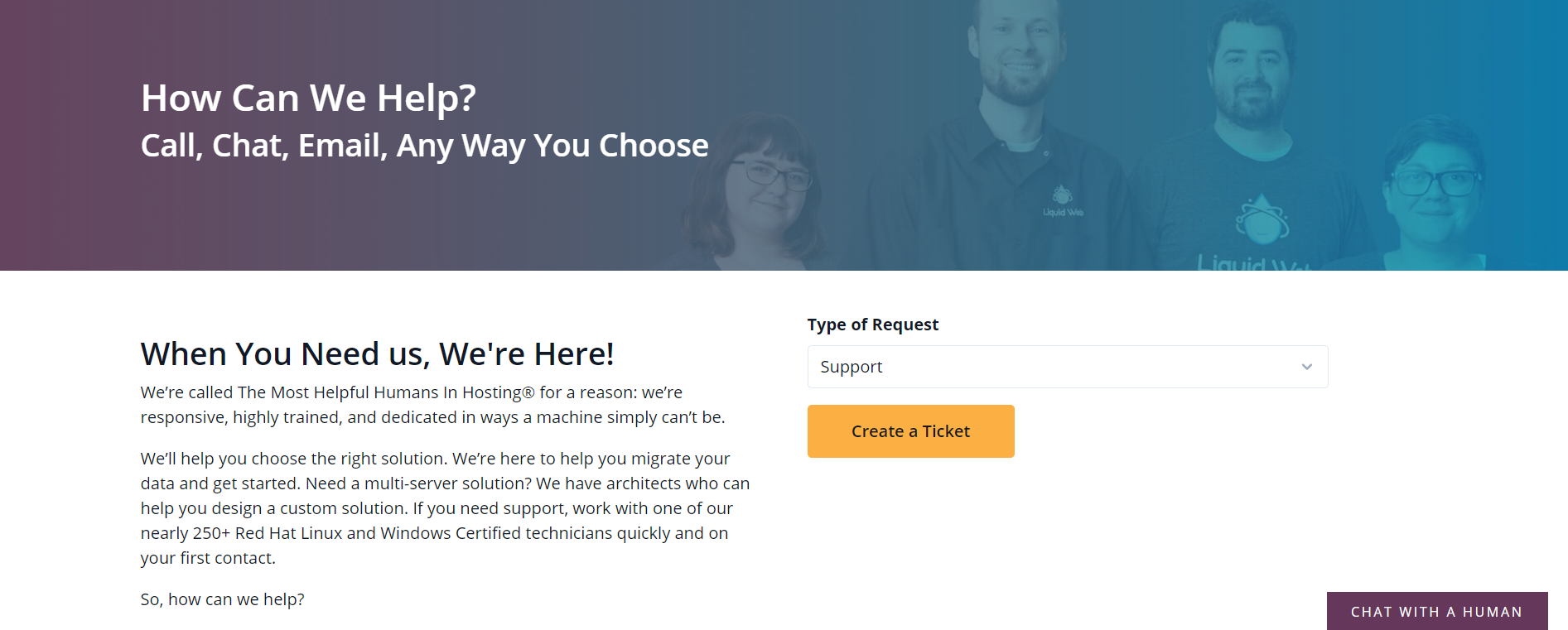
Liquid Web stands out with its impressive 24/7/365 customer support availability, featuring a 59-second initial response guarantee for phone and chat and a 59-minute response for helpdesk tickets. The support infrastructure includes dedicated teams for Windows and Linux, over 250 certified technicians, and additional strategic resources like Customer Success Managers and solution architects. Their Heroic Support® and extensive knowledge base, complemented by webinars and a vast collection of videos, underpin their reputation as “The Most Helpful Humans in Hosting®.”
Web Hosting Hub provides U.S.-based 24/7 support via phone, email, and chat, and guarantees a 90-day full money-back policy. The availability of different departments like sales and billing with specified timeframes enhances dedicated support. They offer an accessible website and a knowledge base for customer self-service. While Web Hosting Hub maintains a solid support system, it lacks the extensive and specialized support features that Liquid Web offers, making Liquid Web the superior choice based on customer service scores.

Liquid Web vs Web Hosting Hub: User feedback
User feedback for the hosting provider is highly polarized. Many long-term customers highlight a significant decline in service quality, stating that the once-excellent customer support and reliability have deteriorated dramatically, causing frequent outages, slower load times, and unresponsive support. These users express frustration over questionable billing practices and ill-informed technical help, urging others to avoid the provider. On the other hand, some users praise the company for its proactive, knowledgeable, and prompt support, emphasizing excellent uptime and reliability. These contrasting reviews suggest a mixed experience, with some users experiencing severe service issues while others remain highly satisfied.
Overall, users appreciate the ease of use, affordability, and extensive features offered by this hosting provider. Many reviews praise the customer support for being responsive and knowledgeable, contributing to a generally positive experience. However, some users have noted the interface can be complex and occasionally overwhelming, and there are mixed feelings about the pricing for additional services like SSL. Despite minor inconveniences such as periodic connectivity issues and maintenance times, the hosting provider is highly recommended for its value and efficient support.
Liquid Web vs Web Hosting Hub: FAQ
Which platform is better suited for hosting WordPress websites?
Both Liquid Web and Web Hosting Hub are suitable for hosting WordPress websites, offering features like auto-installed WordPress and comprehensive management tools. Liquid Web, however, excels with its high-end performance features and advanced support, making it more suitable for demanding and professional WordPress hosting needs. Web Hosting Hub is more budget-friendly and ideal for beginners, making it a good choice for those starting with WordPress.
Which hosting service offers better security features?
Liquid Web provides a more comprehensive suite of security features, including SSL certificates, DDoS protection, intrusion detection systems, and data encryption at rest. It also supports multiple PHP versions and ensures compliance with strict standards such as PCI and HIPAA. Web Hosting Hub offers basic security measures like free SSL certificates, suPHP, and GnuPG encryption, but lacks the extensive security features that Liquid Web provides.
Which platform offers better customer support?
Liquid Web stands out with impressive 24/7/365 customer support, featuring industry-leading response times of 59 seconds for phone and chat and 59 minutes for helpdesk tickets. Supported by a team of over 250 certified technicians, it provides specialized and proactive assistance. Web Hosting Hub also offers 24/7 U.S.-based support through phone, email, and chat, but lacks the extensive and specialized support features that Liquid Web offers.
Which hosting service offers more scalability options for growing websites?
Liquid Web offers extensive scalability options, including VPS hosting, dedicated servers, and cloud solutions with automatic scaling in managed WordPress and WooCommerce hosting. These options are ideal for businesses needing to scale seamlessly. Web Hosting Hub offers upgrade paths between plans such as Spark, Nitro, and Dynamo but lacks dedicated servers and doesn’t support automatic scaling, making it less suited for rapidly growing websites.
What are the major differences in pricing and value between liquidweb and webhostinghub?
Liquid Web offers specialized plans with a focus on performance, security, and advanced features, leading to higher costs ranging from $21 to over $1095 per month, suiting complex and large-scale needs. Web Hosting Hub, on the other hand, provides more affordable shared hosting plans with prices ranging from $5.99 to $20.49 per month, focusing on unlimited storage, bandwidth, and beginner-friendly features. Liquid Web targets high-end users while Web Hosting Hub is more cost-effective for smaller projects.
The making of this blog
We followed a clear, step-by-step process to write and research this article.










